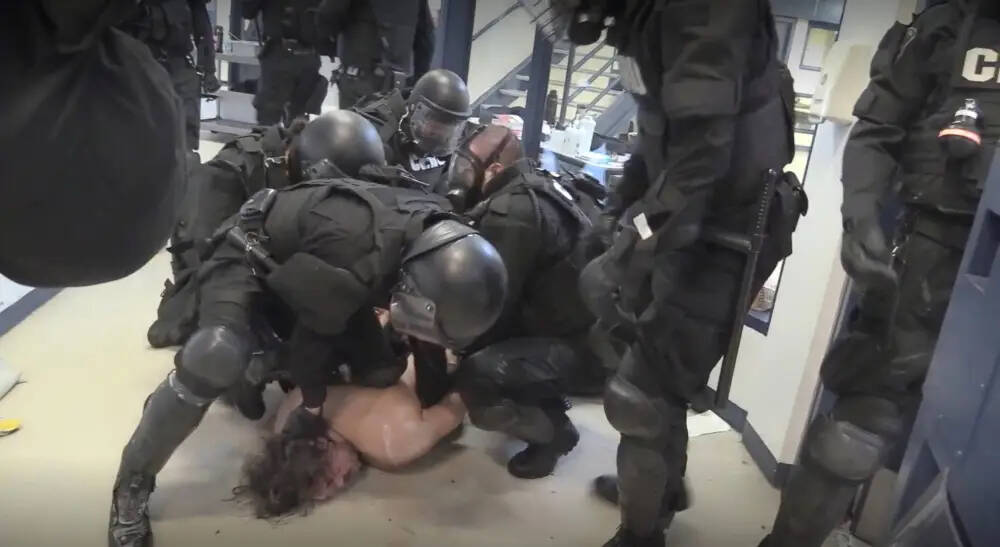Guard found not guilty in inmate’s death
Advertisement
Read this article for free:
or
Already have an account? Log in here »
We need your support!
Local journalism needs your support!
As we navigate through unprecedented times, our journalists are working harder than ever to bring you the latest local updates to keep you safe and informed.
Now, more than ever, we need your support.
Starting at $15.99 plus taxes every four weeks you can access your Brandon Sun online and full access to all content as it appears on our website.
Subscribe Nowor call circulation directly at (204) 727-0527.
Your pledge helps to ensure we provide the news that matters most to your community!
To continue reading, please subscribe:
Add Brandon Sun access to your Free Press subscription for only an additional
$1 for the first 4 weeks*
*Your next subscription payment will increase by $1.00 and you will be charged $20.00 plus GST for four weeks. After four weeks, your payment will increase to $24.00 plus GST every four weeks.
Read unlimited articles for free today:
or
Already have an account? Log in here »
Hey there, time traveller!
This article was published 07/09/2024 (539 days ago), so information in it may no longer be current.
WINNIPEG — A correctional officer broke down in tears in the arms of his wife after a judge acquitted him Friday in the death of an inmate at Headingley jail in 2021.
“The death of Mr. Ahmo represents a terrible tragedy… (but) the evidence before me does not satisfy me of (Robert Jeffery Morden’s) guilt beyond a reasonable doubt on these charges,” provincial court Judge Tony Cellitti said, reading from a 44-page decision.
Family members of William Ahmo and Morden, corrections officers and others filled the large court gallery to capacity to hear the verdict.

Louise Menow said she did not agree with the verdict. (Mikaela MacKenzie/Winnipeg Free Press)
Several of Ahmo’s family members wore T-shirts with Ahmo’s picture and his last words, “I can’t breathe.”
The hearing was delayed for nearly half an hour as people continued to stream into the courtroom. Additional seating had to be added to the aisles.
Morden sat next to his wife, a few feet behind his lawyers, Daniel Wolson and Richard Wolson.
Cellitti’s decision was delivered nearly a year after the court heard closing arguments.
Morden pleaded not guilty to criminal negligence causing death and failing to provide the necessities of life.
Ahmo’s mother, Darlene Ahmo, issued a written statement following the verdict, saying “my heart is broken.”
“I had hoped for justice for my son, but instead we are left with more questions and no accountability for his death. William’s life mattered, and to see no one held responsible is devastating.”
Outside court, tears rolled down Louise Menow’s face as she reacted to the verdict.
“He was more than a friend. He was like a brother to me.”
Menow said she did not agree with the verdict.
“I really don’t think that’s fair,” she said. “Our justice system needs to do better when it comes to situations like this. He did not deserve to go this way.”
The Manitoba Government and General Employees’ Union said in a statement that even though the trial ended with an acquittal, corrections officers need assurance that the training, policies and procedures provided by Manitoba Justice will not result in them being criminally prosecuted.
Ahmo, 45, died in hospital on Feb. 14, 2021. Seven days earlier, the Sagkeeng First Nation man was shackled, pinned to the ground, placed in a spit hood and strapped into a restraint chair in the common area of his unit after a three-hour standoff with guards at the Headingley Correctional Centre.
Morden led the tactical team that responded to the standoff.
Court heard evidence Ahmo flew into a violent, destructive rage after he was told a racist joke, resulting in dozens of inmates in his unit being locked in their cells.
Manitoba’s chief medical examiner deemed Ahmo’s death a homicide. The inmate died from a brain injury caused by a heart attack as he struggled to breathe, a trial heard last year.
Ahmo was in an “extremely agitated” state and exhausted when he was forced into a prone position for several minutes, with his chest pressed to the floor, making it difficult for him to breathe, pathologist Dr. Charles Littman testified.
The inmate had an enlarged heart, was obese and had been hit with pepper spray three times before the takedown, all of which would have compromised his ability to breathe effectively, Littman said.
Video played in court showed Morden and other guards storming the unit and firing chemical irritant projectiles at Ahmo as the inmate stood on a second-floor walkway.
Ahmo, who was brandishing a broken mop handle, advanced on the officers, who forcefully took him to the floor. Ahmo screamed and flailed as officers piled on top of him, forcing his face and neck to the floor.

A still from video evidence presented at court during the trial of Robert Jeffrey Morden. William Ahmo, pinned to the floor and fully restrained, told corrections officers more than a dozen times that he couldn’t breathe.
He told officers more than 20 times while restrained on the floor: “I can’t breathe.”
Ahmo, unmoving, was placed in a restraint chair, after which he was found to have no pulse. A “code red” was issued.
Crown attorney Jason Nicols said officers had no training for the restraint chair, which under the circumstances would have compromised Ahmo’s ability to breathe. Nicol said that under the jail’s 2019 use-of-force policy at the time, the chair was to be used only in cases in which an inmate posed a risk of self-harm.
Cellitti, however, said he accepted the testimony of a use-of-force expert who told court that corrections officers were in fact still operating under a 2017 policy that allowed officers to use the chair to control and restrain violent inmates.
“This provides important context when I consider the objective fault element in this case,” he said.
Richard Wolson said his client had every reason to believe Ahmo’s remark that he couldn’t breathe was connected to the earlier use of pepper spray.
Video of the event provided to court showed Morden responding to Ahmo’s plea that he couldn’t breathe by yelling: “If you’re talking to us, you can breathe.”
“In my view, there was every reason to believe that Mr. Ahmo’s comments about not being able to breathe was as a result of the pepper spray, particularly given that Mr. Ahmo continued to fight, resist and struggle, and given that Mr. Ahmo can be seen breathing heavily at times on the video… something that would have been visible to those present… including the accused,” Cellitti said.
Also, Ahmo alternated periods of violence and combativeness with periods of calm, a pattern that would have meant corrections officers were slow to trust him, Cellitti said.
Convictions for criminal negligence causing death and failing to provide the necessities of life both require that an accused’s conduct constitute a “marked departure” from what a reasonable person would do in the same circumstances.
The trial was told Ahmo was medically cleared by a nurse and two members of Morden’s team before he was placed in the restraint chair and became unresponsive.
“The accused was surrounded by medical personnel that he was entitled to rely upon,” Cellitti said. “However, medical intervention would only have been possible if Mr. Ahmo had not been combative and had not resisted in the manner that he did.”
The Crown has 30 days to appeal Cellitti’s ruling.
“We will assess and review the decision in detail and go from there,” Nicol said outside court.
A spokesperson for Justice Minister Matt Wiebe Friday declined to comment while the 30-day appeal window is open.
» Winnipeg Free Press
